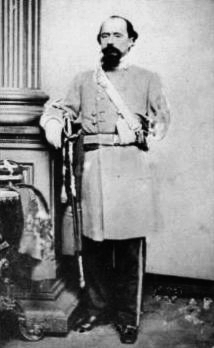 William Wing Loring (December 4, 1818 – December 30, 1886) was an American soldier who served in the armies of the United States, the Confederacy, and Egypt.
William Wing Loring (December 4, 1818 – December 30, 1886) was an American soldier who served in the armies of the United States, the Confederacy, and Egypt.
Civil War
When the Civil War erupted, Loring sided with the South. In a conference in New Mexico, just before he left to defend his homeland, Loring told his officers, “The South is my home, and I am going to throw up my commission and shall join the Southern Army, and each of you can do as you think best.” He resigned from the U.S. Army on May 13, 1861. Upon offering his services to the Confederacy, Loring was promptly commissioned a brigadier general and given command of the Army of the Northwest, participating in the Western Virginia Campaign in the fall of 1861. His first assignment was to quickly collect and rally the shattered remnants of Robert S. Garnett’s force following its defeat at the Battle of Rich Mountain, and drill them in preparation for the defense of western Virginia against Maj. Gen. George B. McClellan’s invasion from Ohio.
After organizing an army of roughly 11,700 at Monterey, Virginia, Loring detached two brigades under Henry R. Jackson and William B. Taliaferro to the north, to fortify Frank Mountain, and defend the approach from Cheat Mountain. Loring moved the rest of his army, the brigades of S.R. Anderson, Daniel S. Donelson, and William Gilham, south to Huntersville. Four days after his arrival at Huntersville, Loring was joined by colonel Robert E. Lee, who had been sent by Richmond to western Virginia with the diplomatic role of inspecting and consulting. Loring, a Mexican War veteran who outranked Lee at the time, saw Lee as Richmond’s attempt to look over his shoulder, and grew resentful of his presence. Loring and Lee moved the southern portion of their army to Valley Mountain, near Mace, and down the Tygart Valley to the Battle of Cheat Mountain in September 1861. Loring soon acquired the nickname, “Old Blizzards” for his battle cry, “Give them blizzards, boys! Give them blizzards!” Following that debacle, they moved south into Greenbrier County to reenforce the troops of the Kanawha Division under former Virginia governors John B. Floyd and Henry Alexander Wise, then-at Sewell Mountain and Meadow Bluff. Lee was re-called back to Richmond in late October. Loring and the men remained for a short period before abandoning the mountainous region too, marching into, and down the Shenandoah Valley to join Stonewall Jackson at Winchester.
Loring famously butted heads with superior officers, particularly with Stonewall Jackson. At the conclusion of the Romney Expedition in northwestern Virginia (now West Virginia) in January 1862, Jackson returned to his headquarters in Winchester while assigning Loring to stay and occupy the small, mountainous town. Unhappy with their assignment of holding a remote outpost in the dead of winter, Loring and his officers went over Jackson’s head to Secretary of War Judah P. Benjamin, requesting that the division be withdrawn. Jackson complied with the order, then resigned in protest of Richmond’s interference with his command; he withdrew his resignation under pressure from Governor John Letcher and his former commander, Joseph E. Johnston, and Loring was reassigned out of Jackson’s command, and given command of the Department of Southwestern Virginia.[2] In his five months in that role, Loring moved a force of 5,000 into the Kanawha Valley, ultimately occupying Charleston for a six week period. In mid-October, Loring was transferred to the West.
By November 1862, Loring was in Grenada, Mississippi, commanding a division in John C. Pemberton’s Department of Mississippi and East Louisiana, another superior officer he had friction with. In early spring of 1863, he defended against the Yazoo Pass Expedition, before his division was ordered south to re-enforce Vicksburg. He was present at Pemberton’s disastrous defeat at Champion Hill. Cut off from the rest of the army, most of his division then marched east to Jackson, Mississippi to join forces with Gen. Joseph E. Johnston for the impending siege. By the end of 1863, he was under the command of Lt. Gen. Leonidas Polk and defended east Mississippi from William T. Sherman during the Meridian Campaign of February 1864. Polk’s relatively small force was then ordered to northwest Georgia to join Joe Johnston’s Army of Tennessee, which was beginning to abandon its winter quarters in Dalton, Georgia to start the Atlanta Campaign. Polk’s divisions, one commanded by Loring, arrived just in time to temporarily thwart a flanking maneuver by Union General James B. McPherson at the Battle of Resaca. Facing overwhelming numbers, Johnston’s army was continuously flanked and forced to withdraw closer and closer to Atlanta.
Loring temporarily took command of Polk’s III corps when Polk was nearly cut in two by an artillery round and killed at Pine Mountain on June 14, 1864. He led the corps during the Battle of Kennesaw Mountain but was soon replaced on July 7, 1864 by Lt. Gen. Alexander P. Stewart. Loring returned to divisional command, fighting at the Battle of Peachtree Creek, and at Ezra Church, where he was wounded. Loring was out of action until after the fall of Atlanta. Upon returning he commanded his division in Stewart’s corp of army now commanded by John Bell Hood, seeing combat at the Franklin on November 30, 1864, and Nashville in mid-December. In the last year of the war, the remnants of Hood’s smashed forces returned east to participate in the Carolinas Campaign, seeing action at the Battle of Bentonville before being surrendered by Johnston at Durham, North Carolina a month later.
Content retrieved from: https://en.wikipedia.org/wiki/William_Wing_Loring.